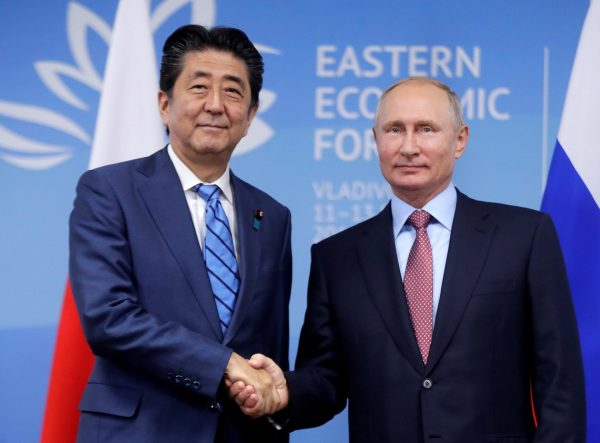Abe must continue managing his relationship with US President Donald Trump. Ensuring that Japan’s relationship with the United States does not enter into a crisis is essential. It is also important for Japan to maintain improved relations with China, even if these relations are of a tactical nature.
But these issues are not the ones with which Abe intends to leave his legacy. The policies that will make their mark on history are those left currently unfinished in Abe’s dossier — those to do with Russia and, with luck, North Korea.
Despite two years of near-complete suspension of negotiations due to Crimea and Ukraine, and despite massive attacks against Russian President Vladimir Putin from Washington due to his alleged meddling in the 2016 US presidential election, Abe’s willingness to make a peace deal with Putin has not faltered. It was on show in his Vladivostok meeting with Putin on 12 September, where the two leaders reiterated the necessity of a peace treaty — just like they did in Putin’s visit to Yamaguchi-Tokyo in December 2016.
Three years is enough to conclude a peace treaty with Russia. But its pursuit is not without political risks. Abe must give assurances to Trump that peace negotiations with Russia are no catastrophe for Japan–US relations. Then he must convince Japan’s conservative nationalists that he is gaining the best possible outcome on the long disputed islands of Kunashiri and Etorofu that Japan can hope for. Although this may cause a stir among Japanese nationalists, there is no-one in Japan with better authority than Abe to explain that there are no other realistic options on the table.
As for North Korea, Abe was swift to change his policy of ‘pressuring only’ to a policy centred on dialogue immediately after North Korean leader Kim Jong-un and South Korean President Moon Jae-in issued the Panmunjom Declaration on 27 April.
Japanese Foreign Minister Taro Kono issued a statement on the same day declaring that Japan would return to the 2002 Pyongyang Declaration and, based on that Declaration, three agenda items would be pursued: the abduction issue, denuclearisation of the Peninsula and the normalisation of relations with North Korea. Abe now intends to meet Kim to settle the abduction issue in person.
The domestic political risks for Abe in negotiating with North Korea might be even greater. Abe’s declared willingness to meet with Kim is contingent upon the continuation of Trump–Kim exchanges. And even if US–North Korea dialogue continues and conditions are improved for Abe’s meeting with Kim, Abe must create a climate of confidence at home in which Japanese families will feel satisfied with what is agreed upon in a deal with North Korea. It remains to be seen whether Abe and his foreign policy advisors can instil that basis of confidence.
Kazuhiko Togo is Professor of International Politics and Director of the Institute of World Affairs, Kyoto Sangyo University.

